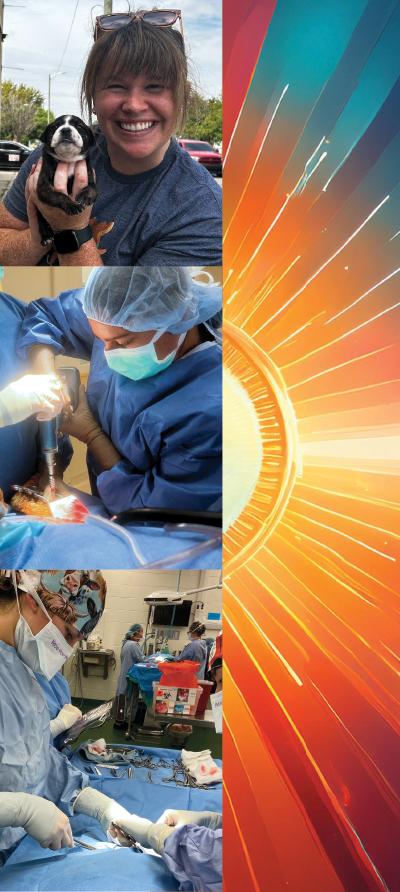

A common sentiment around the College is that all veterinary professionals are leaders in their communities. Among those leaders, some stand out as people the rest turn to for support and guidance.
Veterinary school is the same. It’s known to be challenging. Luckily, each class has a few fearless leaders to rely on—their elected class officers, also known as the E-board. At the helm of it all is the class president.
This leadership role adds an extra layer of difficulty to veterinary school, but it also provides an opportunity to hone communication, management, and delegation skills.
Three current class presidents have weighed in on the challenges and highlights of the role: Megan White (Class of 2027), Mirelle Syrja, Esq. (Class of 2026), and Vasia Murphy (Class of 2025).
Class presidents at the College are elected within the first semester of their first year, alongside positions such as secretary and treasurer. Students can nominate themselves or classmates, and then the roles are voted on by the class.
White was surprised when her classmates nominated her for president but decided to step into the opportunity. Syrja and Murphy both knew from the start that they wanted to be a voice for their classes.
“I am very passionate about making a difference in people’s lives. I chose to run for president because I hoped to start making a change here within the university and in veterinary medicine as a whole,” says Murphy.
“I’m a non-traditional veterinary student,” explains Syrja, “I’m 45 and I have a whole different perspective and journey than my classmates. But after getting to know everyone, and with my history as an attorney, I knew I was equipped to advocate for my class.”
All three have held leadership positions in the past; however, the class president role has proven to be a unique beast.
“It’s a learning curve,” says White. “When you’re in an organization, you usually only become a leader after you’ve been a member first. I became class president within my first month here. I was trying to figure out classes alongside my classmates while I was also their resource for information I didn’t even know yet.”
“I was on E-boards in the past, but I never went for president or vice president roles,” says Murphy. “I just didn’t see myself in that position. I took two years out of undergrad and worked as a licensed veterinary technician for a bit, where I developed my leadership skills. That’s what built my confidence to take on something bigger.”
Every president’s experience is different because the dynamics of their classes affect their leadership.
“My classmates are assertive. I feel like I have done a good job of filtering the wants and desires of my class that affect the whole population as opposed to a niche set,” says Murphy.
The ability to hear out their classes and gauge the urgency and impact of each concern is vital. A key component of that is understanding how their class typically interacts.
“Coming out of a busy second-year, exigency is important to my class. My analytical skills are valuable because I can step back and see everyone’s perspective. It’s easy to get focused on one issue, especially if it’s negatively affecting you here. Those who are struggling probably aren’t alone, and finding everyone affected is a big part of the role,” adds Syrja.
None of them do it alone—having members of the administration and their E-board to lean on helps each president better understand the concerns affecting their classes and work toward resolution.


“I value input from everyone on my E-board. They’re all part of different interest groups within my class, which helps us get a picture of the entire class,” says Murphy.
“It’s just amazing how much self-awareness I gained at VLE,” says White.“I came back with ideas for the future.”
“It’s a one-week journey of getting to know yourself. The hope is you get stronger within, and then you bring that extra power to your position,” adds Syrja.
In the end, what does it take to be a leader in a profession of leaders?
“When people think of a leader, they think of the president of the United States and are intimidated,” says Murphy. “Working general practice, nine-to-five, is being a leader in your community too. No matter what type of leader you are, it’s important to take an objective perspective and center what is affecting the people around you.”
“There’s so much that goes on within leadership that is done behind the scenes. We are always working for our classes,” says Syrja.
“In the end, anyone can be a leader,” says White. “It doesn’t have to be someone extroverted or someone with leadership experience—just someone who wants to make a positive change.”
